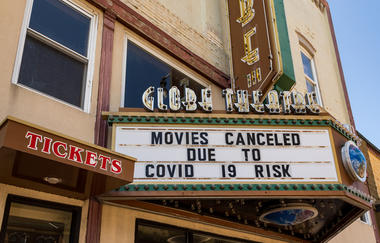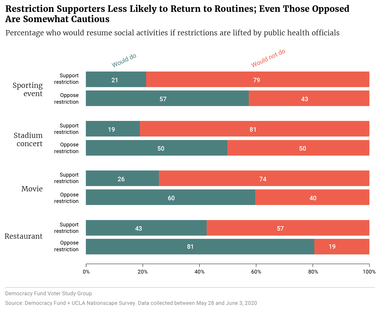
For the last few months, life in many states has been radically different. Schools and businesses have shuttered, and community events and informal gatherings have been canceled to halt the spread of COVID-19. At the time of this writing, majorities of Americans continue to support these restrictions. However, support for these measures has been slowly fading over time. In particular, Republicans have become notably less supportive of several policies since mid-March.
One natural assumption might be that those opposed to a policy — say, the closure of restaurants — might also be those who are most eager to enjoy the activity it prohibits once restrictions are lifted. Similarly, one might assume that those who are supportive of a policy would be cautious about engaging in the activity it prohibits.
Data from the Democracy Fund + UCLA Nationscape™ survey suggests that the relationship between support for local restrictions and willingness to return to public life is muddier than one might expect. In fact, substantial numbers of those opposed to these policies say they would not engage in the restricted activities if the restrictions were lifted. The opposite is also true — supporters of the policies are not necessarily as cautious about returning to these activities as one might assume.
According to Nationscape data collected between May 28 and June 3, about three-quarters (71 percent) of Americans support the closure of businesses like restaurants, bars, or theaters. Twenty-one percent oppose this policy.
However, among those who oppose the policy and say that they dined out prior to COVID-19, one in five (19 percent) say they definitely or probably would not return to a restaurant even if public health officials were to advise that those restrictions be lifted. Meanwhile, 43 percent of those supportive of the closures say they would return to restaurants if the restrictions were lifted.
This mix of attitudes looks similar for other activities. About four in ten (40 percent) of those opposed to business closures also say they would not go back to the movies if restrictions were lifted. One-quarter (26 percent) of those supporting the closures say they would.
Likewise, those who support and oppose canceling large-group activities like concerts and sporting events are not a monolithic bloc when it comes to re-engaging in these experiences. Approximately half of those opposing these cancelations nevertheless report that they would not attend stadium concerts (50 percent) or professional sporting events (43 percent). Smaller numbers of those supporting the cancelations say they would engage in these activities if public health officials advised lifting the restriction (19 percent and 21 percent).
Figure 1

While substantial majorities of Americans continue to support these restrictions, a growing minority say they are opposed. As businesses and lawmakers plan for the coming months, they would do well to keep the muddy relationship between feelings about the restrictions and Americans’ willingness to re-engage in activities in mind.
Subscribe to our mailing list for updates on new reports, survey data releases, and other upcoming events.